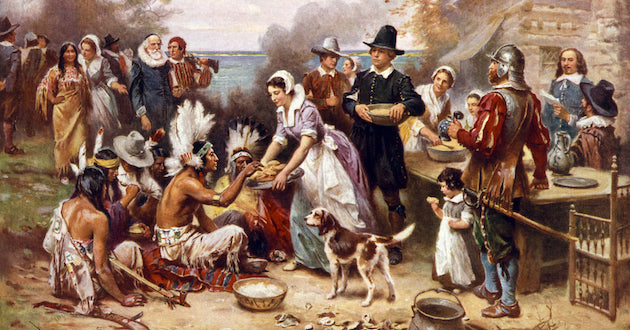The Pilgrims left Plymouth, England, on September 6, 1620. Their destination? The New World. Although filled with uncertainty, it offered hope for both civil and religious liberty. For over two months, the 102 passengers braved the harsh elements of a vast storm-tossed sea. Finally, with firm purpose and a reliance on Divine Providence, the cry of “Land!” was heard.
Arriving in Massachusetts in late November, the Pilgrims sought a suitable landing place. On December 11, just before disembarking at Plymouth Rock, they signed the “Mayflower Compact” – America’s first document of civil government and the first to introduce self-government.
After a prayer service, the Pilgrims began building hasty shelters. However, unprepared for the starvation and sickness of a harsh New England winter, nearly half died before spring. Yet, persevering in prayer, and assisted by helpful Indians, they reaped a bountiful harvest the following summer. The grateful Pilgrims then declared a three-day feast, starting on December 13, 1621, to thank God and to celebrate with their Indian friends. While this was not the first Thanksgiving in America (thanksgiving services were held in Virginia as early as 1607), it was America’s first Thanksgiving Festival.
In 1789, following a proclamation Issued by President George Washington, America celebrated its first Day of Thanksgiving to God under its new constitution. That same year . . . President Washington announced that the first Thursday in November would become its regular day of giving thanks, “unless another day be appointed by the civil authorities.” Yet, despite these national proclamations, official Thanksgiving observances usually occurred only at the State level.
Much of the credit for the adoption of a later annual national Thanksgiving Day may be attributed to Mrs. Sara Joseph Hale, who for 30 years promoted the idea of a national Thanksgiving Day, contacting President after President until President Abraham Lincoln responded in 1863 by setting aside the last Thursday of November as a national Day of Thanksgiving. Over the next 75 years, Presidents followed Lincoln’s precedent, annually declaring a national Thanksgiving Day. Then in 1941, Congress permanently established the fourth Thursday of each November as a national holiday.
Lincoln’s original 1863 Thanksgiving Proclamation came – spiritually speaking – at a pivotal point in his life. During the first week of July of that year, the Battle of Gettysburg occurred, resulting in the loss of some 60,000 American lives. Four months later in November, Lincoln delivered his famous “Gettysburg Address.” It was while Lincoln was walking among the thousands of graves there at Gettysburg that he committed his life to Christ.
As Lincoln explained to a friend: “When I left Springfield I asked people to pray for me. I was not a Christian. When I buried my son, the severest trial of my life, I was not a Christian. But when I went to Gettysburg and saw the graves of thousands of our soldiers, I then and there consecrated myself to Christ.”
As Americans celebrate Thanksgiving each year, we hope they will retain the original gratefulness to God displayed by the Pilgrims and many other founding fathers, and remember that it is to those early and courageous Pilgrims that we owe not only the traditional Thanksgiving holiday but also the concepts of self-government, the “hard-work” ethic, self-reliant communities, and devout religious faith.
“Know ye that the LORD he is God: it is he that hath made us, and not we ourselves; we are his people, and the sheep of his pasture. Enter into his gate with thanksgiving, and into his courts with praise: be thankful unto him, and bless his name. For the LORD is good; his mercy is everlasting; and his truth endureth to all generations.” ~ Psalm 100:3-5








